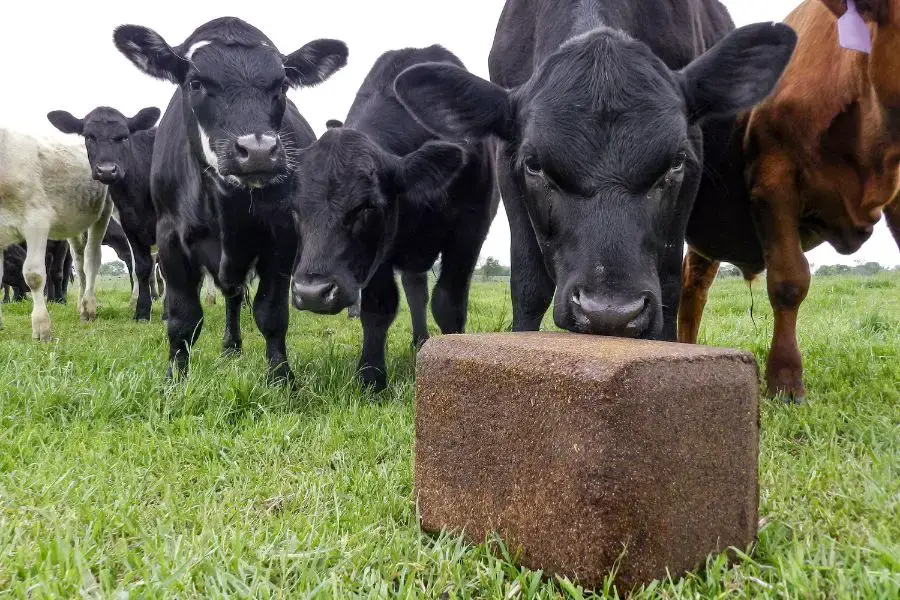Cattle farming is a complex industry that requires careful attention to the health and nutrition of the animals. Providing the right minerals to cattle is essential for their overall well-being and productivity. One popular method of supplementing minerals in the diet of cattle is through mineral blocks.
However, with so many options available in the market, choosing the best mineral block for cattle can be a daunting task for farmers. This comprehensive guide aims to provide farmers with all the necessary information to make an informed decision and select the most suitable mineral block for their cattle.
Understanding the importance of mineral blocks for cattle
Understanding the importance of mineral blocks for cattle is crucial in ensuring the overall health and productivity of the animals. Mineral blocks provide essential minerals and trace elements that may be lacking in the cattle’s diet. These minerals play a vital role in various physiological functions, including bone development, reproduction, immune system function, and overall growth.
Inadequate mineral intake can lead to deficiencies, which can manifest as reduced fertility, impaired immune function, poor growth rates, and increased susceptibility to diseases. By providing cattle with mineral blocks, farmers can help prevent these issues and promote optimal health.
Moreover, mineral blocks offer a convenient and efficient method of supplementing minerals in a controlled manner. Unlike loose mineral supplements that can get easily wasted or blown away, mineral blocks provide a steady supply of minerals and allow cattle to self-regulate their intake.
Factors to consider when selecting a mineral block
When choosing a mineral block for your cattle, there are several factors to consider to ensure you provide the best option for their nutritional needs. Firstly, it is vital to identify the specific deficiencies in your cattle’s diet. Conducting a forage analysis or seeking advice from a veterinarian or nutritionist can help you determine the specific minerals your cattle require.
Secondly, consider the composition and quality of the mineral block. Look for blocks that contain a comprehensive blend of essential minerals and trace elements, including calcium, phosphorus, magnesium, copper, zinc, and selenium. Ensure that the block is made from high-quality ingredients to guarantee effective absorption by the cattle.
Lastly, consider the consistency and palatability of the mineral block. Cattle are more likely to consume it regularly if they find it appealing. Opt for blocks that have a smooth and consistent texture, making them easy for the cattle to lick.
By taking these factors into account, you can choose the best mineral block to meet your cattle’s specific requirements.
Different types of mineral blocks and their benefits
Now that you understand the factors to consider when choosing a mineral block for your cattle, let’s explore the different types available and their unique benefits.
Salt-based mineral blocks:
These blocks contain a high concentration of salt and are an excellent choice for cattle living in hot climates or those with a high level of dehydration. Salt-based mineral blocks help replenish electrolytes and encourage water intake, supporting overall hydration.
High-phosphorus mineral blocks:
If your cattle show deficiencies in phosphorus, opt for mineral blocks with a higher concentration of this essential mineral. Phosphorus plays a crucial role in skeletal development, reproductive health, and milk production.
Organic mineral blocks:
Farmers who prioritize organic practices can find mineral blocks that are certified organic. These blocks are free from synthetic additives and are made using natural, sustainably sourced ingredients.
Medicinal mineral blocks:
Some mineral blocks are infused with medications or supplements to address specific health concerns such as parasite control or hoof health. Consider these blocks if your cattle require additional support in these areas.
By understanding the different types of mineral blocks available and their benefits, you can select the most suitable option to meet your cattle’s specific requirements. Remember to consult with a veterinarian or nutritionist for personalized advice based on your herd’s needs.
Evaluating the nutritional content of mineral blocks
When choosing the best mineral block for your cattle, it is crucial to evaluate the nutritional content of the blocks available. Different mineral blocks contain varying levels of essential minerals, and understanding these levels can help you make an informed decision.
One way to evaluate the nutritional content of mineral blocks is to check the guaranteed analysis on the packaging. This analysis provides information about the minimum and maximum levels of specific minerals present in the block. Look for blocks that offer a balanced blend of minerals, including calcium, phosphorus, magnesium, copper, zinc, and selenium.
Additionally, consider the availability and absorbability of the minerals in the block. Some blocks may contain minerals in forms that are less bioavailable to cattle, making it difficult for them to absorb and utilize the nutrients effectively. Look for blocks that use chelated minerals or other forms that are more easily absorbed.
By carefully evaluating the nutritional content of mineral blocks, you can ensure that your cattle receive the essential minerals they need for optimal health and performance. Remember to consult with a veterinarian or nutritionist to determine the specific mineral requirements of your herd and choose a mineral block that meets those needs.
The role of mineral blocks in promoting animal health and productivity
In addition to providing essential minerals for your cattle, mineral blocks play a crucial role in promoting overall animal health and productivity. Adequate mineral intake is essential for various physiological functions in cattle, including proper growth, reproduction, immune function, and milk production.
Mineral blocks can help prevent and correct mineral deficiencies, which can lead to serious health issues in cattle. For example, a deficiency of calcium and phosphorus can result in weak bones and teeth, while a lack of copper and zinc can impact fertility and immune function.
By ensuring that your cattle have access to a high-quality mineral block, you can help optimize their nutrient intake and prevent these deficiencies. This, in turn, can improve the overall health and productivity of your herd.
Best practices for introducing and monitoring mineral blocks
Introducing mineral blocks to your cattle’s diet and monitoring their usage is essential for ensuring optimal health and productivity. Here are some best practices to follow:
Gradual Introduction:
When introducing mineral blocks to your cattle, do so gradually to allow them to adjust to the new taste and texture. Start with small amounts and gradually increase the dosage over a period of a few weeks.
Proper Placement:
Place mineral blocks in a location easily accessible to the cattle. Ensure that the blocks are protected from the elements and placed at a height that is convenient for the animals to reach.
Sufficient Availability:
Provide enough mineral blocks to meet the nutritional needs of your entire herd. Consider the number of cattle, their age, weight, and production stage when determining the quantity of mineral blocks required.
Regular Monitoring:
Regularly check the consumption levels of mineral blocks. If blocks are being consumed too quickly, it could indicate a mineral deficiency. On the other hand, if the blocks are not being consumed at all, it may be necessary to investigate potential digestive or palatability issues.
Adjust as Needed:
Based on the consumption levels and specific needs of the individual animals, adjust the quantity and type of mineral blocks provided. Consult with a veterinarian or nutritionist for guidance on balancing the mineral intake for your specific herd.
By following these best practices for introducing and monitoring mineral blocks, you can ensure that your cattle receive the necessary minerals for optimal health and productivity. In the next section, we will explore the different factors to consider when choosing a mineral block for your cattle.
Expert recommendations for choosing the best mineral block for your cattle
When it comes to choosing the best mineral block for your cattle, it’s important to consider a few key factors. First and foremost, consult with a veterinarian or animal nutritionist who can provide expert guidance based on the specific needs of your herd. They can help you determine the ideal mineral composition and balance for optimal health and productivity.
Additionally, consider the climate and environment in which your cattle will be consuming the mineral block. Some blocks are formulated to withstand extreme temperatures or resist moisture, ensuring that the minerals remain available and intact for longer periods of time.
Another consideration is the formulation of the mineral block. Different blocks may contain varying levels of essential minerals, vitamins, or additives to support specific stages of production, such as growth, reproduction, or lactation. Understanding the needs of your cattle at each stage will help you select the right mineral block.
Lastly, assess the palatability and consumption rate of the mineral block. Some cattle may have preferences for certain flavors or textures, so it’s important to choose a block that your cattle will readily consume.
By taking these expert recommendations into account, you can confidently choose the best mineral block for your cattle, promoting their overall health and productivity.
Conclusion:
Choosing the best mineral block for your cattle is a crucial decision that directly impacts their health and productivity. By consulting with a veterinarian or animal nutritionist, you can gain expert guidance tailored to your herd’s specific needs. This ensures you select the ideal mineral composition and balance.
Considering the climate and environment in which your cattle will consume the mineral block is also essential. Look for blocks that can withstand extreme temperatures or resist moisture, ensuring the availability and integrity of the minerals for an extended period.
The formulation of the mineral block is another crucial aspect. Different blocks offer varying levels of essential minerals, vitamins, and additives to support specific production stages. Understanding your cattle’s needs during growth, reproduction, or lactation will aid in selecting the right mineral block.
Lastly, palatability and consumption rate matter. Choose a block with flavors and textures that appeal to your cattle, ensuring they will readily consume it.
By considering these factors, you can confidently invest in the best mineral block for your cattle, promoting their overall health and performance.










Hello!! My name is Jeanine
I love to eat, travel, and eat some more! I am married to the man of my dreams and have a beautiful little girl whose smiles can brighten anyone’s day!